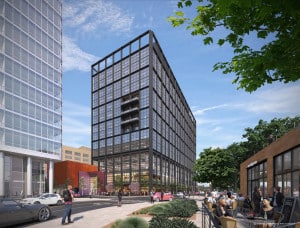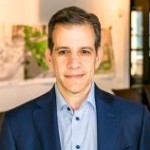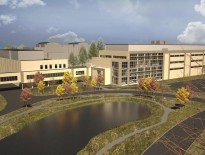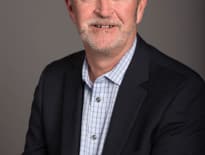
After leasing up its Van Ness office building, Samuels & Assoc. is proposing a 506,000-square-foot office and lab building called 401 Park at the Landmark Center in the Fenway. Courtesy Elkus Manfredi Architects
The Massachusetts life sciences industry – home to 17 of the top 20 biopharmaceutical firms, all 10 of the world’s leading medical device companies and 900 other biopharma companies and medical device makers – is booming. But with commercial vacancy rates at an all-time low in Greater Boston, life sciences companies are increasingly looking beyond the traditional center of Kendall Square to locate their office.
The evolution of Fenway as a cluster for innovation economy and life sciences companies during the past few years highlights how it is possible to foster a lively community that supports the continued growth of one of our commonwealth’s most important industries.
Life sciences tenants are looking for two things: thoughtfully designed, flexible lab space and great employees to drive their companies forward. In the race to attract and retain a diverse workforce, the amenities outside the office matter. The crux of what makes the Fenway such a draw to our growing innovation economy and life sciences tenant base is the neighborhood. In building out the ground floor retail spaces we operate in the Fenway, we consciously curated a mix of uses that would support employees before, during and after work.
With casual lunch spots, quirky coffee shops and great restaurants where coworkers can both brainstorm and unwind, food is clearly a part of The Fenway’s benefits. But we also make it easy for employees to run errands at Target; exercise the gym, spin studio or yoga; and recharge at nearby museums and entertainment venues. And we keep on investing – creating a new public park, planning for a world-class food hall, installing vibrant public art.
Decibel Therapeutics recently moved from Cambridge to the Fenway.
“The Van Ness building certainly had the right type of space for our needs – flexible, focused on collaboration, technically sound. But it was the intangible qualities of the Fenway that won us over: the energy and innovative vibe, the places where our team could go for lunch or after work and the presence of other companies that were fast growing like Decibel,” said Steve Holtzman, president and chief executive officer of Decibel Therapeutics and a Van Ness tenant.
Cluster Of Collaboration
The other great draw for tenants is The Fenway’s proximity to a talented pool of employees and collaborators – something that is enormously important to life sciences companies. Located not far from Longwood Medical Area containing most of Boston’s hospitals, many colleges and universities, and both Harvard Medical School and School of Public Health, there are endless possibilities for collaboration, recruitment and casual encounters that result in great new ideas.
Equally important is the accessibility of diverse transportation options: from the MBTA’s Green Line and a recently improved commuter rail station to updated bike paths and walkability to several residential neighborhoods in Brookline and Boston, Fenway is within reach of a diverse pool of employees.
To jumpstart the evolution of the Fenway, Samuels worked on seeding a culture of innovation. In 2014, we launched the wildly successful Hatch Fenway, an incubator for growing companies with disruptive ideas. By offering ultra-cost-effective short-term leases and other shared space amenities, we attracted young, energetic and rising companies to the Fenway for the first time. When it joined Hatch, Toast was an emerging company; two years later its all-in-one restaurant technology platform makes it one of the fastest-growing technology companies in the U.S and it has graduated to larger office space. Today, Pulse @Mass Challenge is continuing the trend by connecting digital health companies with great opportunities (many found in the nearby hospitals).
The energy from the Fenway’s active streetscapes clearly carries into the building above – and vice-versa.
Peter Sougarides is executive vice president of development and a principal at Samuels & Assoc.









